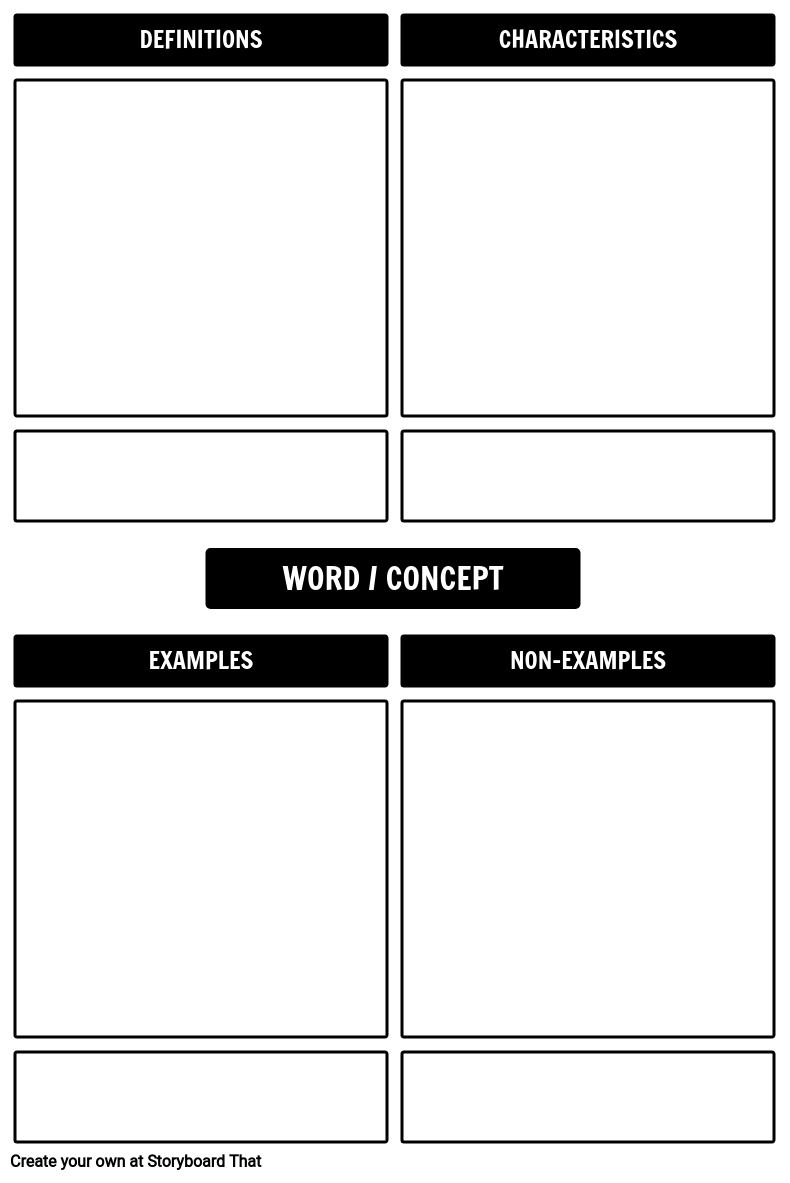Activity Overview
In this activity, students demonstrate their understanding of vocabulary words using a Frayer Model. After choosing a word, students provide a definition, characteristics, examples (synonyms), and non-examples (antonyms) of the word. Students may be provided the vocabulary words, or they can use words that they have discovered through their reading of the text.
This example uses the word “evolve”:
- Definition: to develop or change gradually
- Characteristics: "All in all, the bicycle actually evolved from the kiddy-car."
- Examples: grow, mature, unfold
- Non-examples: leave, stop, diminish, lessen
Template and Class Instructions
(These instructions are completely customizable. After clicking "Copy Activity", update the instructions on the Edit Tab of the assignment.)
Student Instructions
Create a Frayer Model for one of the vocabulary words from Toys!.
- Choose a vocabulary word and type it into the center title box.
- Find the definition in a print or online dictionary and enter it into the description box under Definition.
- Illustrate the meaning of the word in the Definition cell using a combination of scenes, characters, and items.
- Alternatively, use Photos for Class to show the meaning of the words with the search bar.
- Think of at least three characteristics that help expand the meaning beyond the definition.
- Provide written and visual examples of the word.
- Provide written and visual non-examples of the word.
Lesson Plan Reference
Rubric
(You can also create your own on Quick Rubric.)
| Proficient | Emerging | Beginning | |
|---|---|---|---|
| Definition | Student entered a correct definition for the vocabulary word and included the part of speech. | Student entered a correct definition for the vocabulary word, but did not include the correct part of speech. | Student entered an incorrect definition for the vocabulary word, and/or did not include the correct part of speech. |
| Characteristics | Student provided at least three characteristics of the vocabulary word or concept to expand or clarify the definition. | Student provided two characteristics of the vocabulary word or concept to expand or clarify the definition. | Student provided only one characteristic of the vocabulary word or concept to expand or clarify the definition. |
| Examples | Student provided at least three examples demonstrating understanding of the vocabulary word. | Student provided two examples demonstrating understanding of the vocabulary word. | Student provided only one example demonstrating understanding of the vocabulary word. |
| Non-Examples | Student provided at least three non-examples demonstrating understanding of the vocabulary word. | Student provided two non-examples demonstrating understanding of the vocabulary word. | Student provided only one non-example demonstrating understanding of the vocabulary word. |
Activity Overview
In this activity, students demonstrate their understanding of vocabulary words using a Frayer Model. After choosing a word, students provide a definition, characteristics, examples (synonyms), and non-examples (antonyms) of the word. Students may be provided the vocabulary words, or they can use words that they have discovered through their reading of the text.
This example uses the word “evolve”:
- Definition: to develop or change gradually
- Characteristics: "All in all, the bicycle actually evolved from the kiddy-car."
- Examples: grow, mature, unfold
- Non-examples: leave, stop, diminish, lessen
Template and Class Instructions
(These instructions are completely customizable. After clicking "Copy Activity", update the instructions on the Edit Tab of the assignment.)
Student Instructions
Create a Frayer Model for one of the vocabulary words from Toys!.
- Choose a vocabulary word and type it into the center title box.
- Find the definition in a print or online dictionary and enter it into the description box under Definition.
- Illustrate the meaning of the word in the Definition cell using a combination of scenes, characters, and items.
- Alternatively, use Photos for Class to show the meaning of the words with the search bar.
- Think of at least three characteristics that help expand the meaning beyond the definition.
- Provide written and visual examples of the word.
- Provide written and visual non-examples of the word.
Lesson Plan Reference
Rubric
(You can also create your own on Quick Rubric.)
| Proficient | Emerging | Beginning | |
|---|---|---|---|
| Definition | Student entered a correct definition for the vocabulary word and included the part of speech. | Student entered a correct definition for the vocabulary word, but did not include the correct part of speech. | Student entered an incorrect definition for the vocabulary word, and/or did not include the correct part of speech. |
| Characteristics | Student provided at least three characteristics of the vocabulary word or concept to expand or clarify the definition. | Student provided two characteristics of the vocabulary word or concept to expand or clarify the definition. | Student provided only one characteristic of the vocabulary word or concept to expand or clarify the definition. |
| Examples | Student provided at least three examples demonstrating understanding of the vocabulary word. | Student provided two examples demonstrating understanding of the vocabulary word. | Student provided only one example demonstrating understanding of the vocabulary word. |
| Non-Examples | Student provided at least three non-examples demonstrating understanding of the vocabulary word. | Student provided two non-examples demonstrating understanding of the vocabulary word. | Student provided only one non-example demonstrating understanding of the vocabulary word. |
More Storyboard That Activities
Toys! Amazing Stories Behind Great Inventions
- 365_045 • Canned Muffins • License Attribution (http://creativecommons.org/licenses/by/2.0/)
Introductory School Offer
ONLY$500
- 1 School
- 5 Teachers for One Year
- 1 Hour of Virtual PD
30 Day Money Back Guarantee • New Customers Only • Full Price After Introductory Offer • Access is for 1 Calendar Year
© 2025 - Clever Prototypes, LLC - All rights reserved.
StoryboardThat is a trademark of Clever Prototypes, LLC, and Registered in U.S. Patent and Trademark Office






